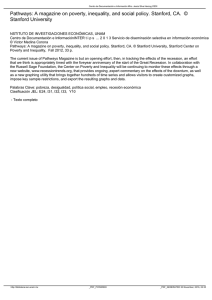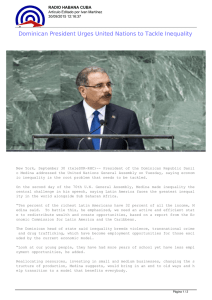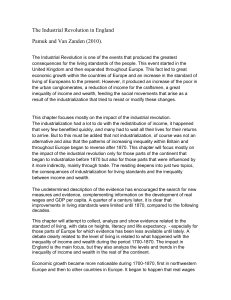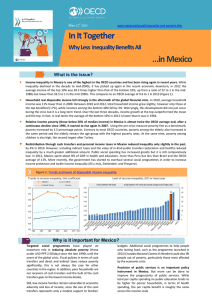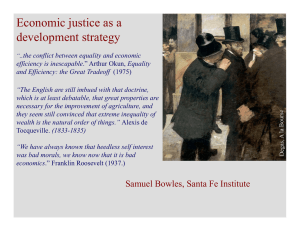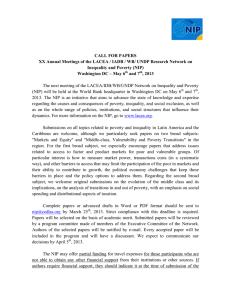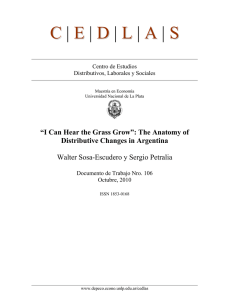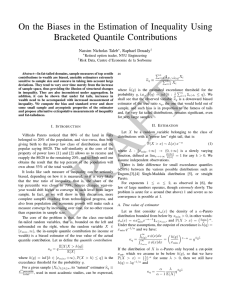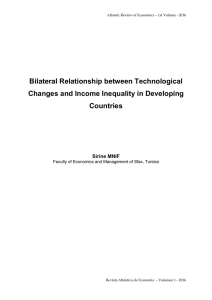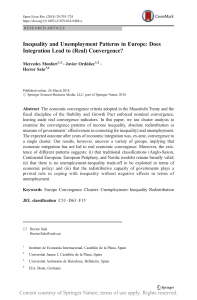essay economic history
Anuncio
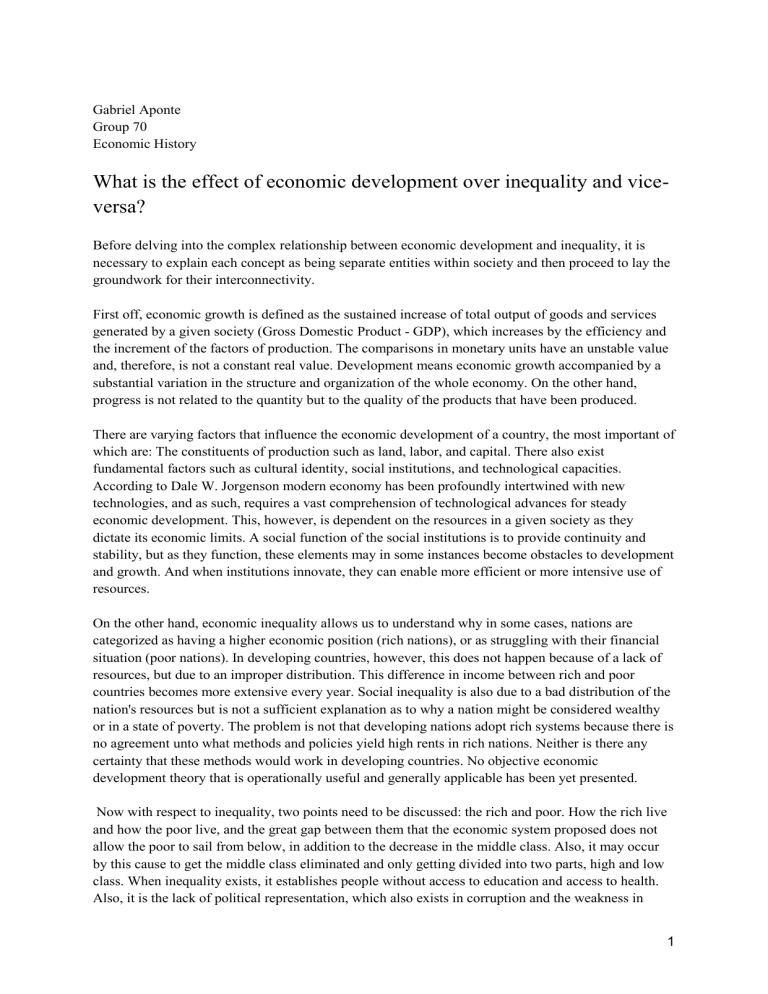
Gabriel Aponte Group 70 Economic History What is the effect of economic development over inequality and viceversa? Before delving into the complex relationship between economic development and inequality, it is necessary to explain each concept as being separate entities within society and then proceed to lay the groundwork for their interconnectivity. First off, economic growth is defined as the sustained increase of total output of goods and services generated by a given society (Gross Domestic Product - GDP), which increases by the efficiency and the increment of the factors of production. The comparisons in monetary units have an unstable value and, therefore, is not a constant real value. Development means economic growth accompanied by a substantial variation in the structure and organization of the whole economy. On the other hand, progress is not related to the quantity but to the quality of the products that have been produced. There are varying factors that influence the economic development of a country, the most important of which are: The constituents of production such as land, labor, and capital. There also exist fundamental factors such as cultural identity, social institutions, and technological capacities. According to Dale W. Jorgenson modern economy has been profoundly intertwined with new technologies, and as such, requires a vast comprehension of technological advances for steady economic development. This, however, is dependent on the resources in a given society as they dictate its economic limits. A social function of the social institutions is to provide continuity and stability, but as they function, these elements may in some instances become obstacles to development and growth. And when institutions innovate, they can enable more efficient or more intensive use of resources. On the other hand, economic inequality allows us to understand why in some cases, nations are categorized as having a higher economic position (rich nations), or as struggling with their financial situation (poor nations). In developing countries, however, this does not happen because of a lack of resources, but due to an improper distribution. This difference in income between rich and poor countries becomes more extensive every year. Social inequality is also due to a bad distribution of the nation's resources but is not a sufficient explanation as to why a nation might be considered wealthy or in a state of poverty. The problem is not that developing nations adopt rich systems because there is no agreement unto what methods and policies yield high rents in rich nations. Neither is there any certainty that these methods would work in developing countries. No objective economic development theory that is operationally useful and generally applicable has been yet presented. Now with respect to inequality, two points need to be discussed: the rich and poor. How the rich live and how the poor live, and the great gap between them that the economic system proposed does not allow the poor to sail from below, in addition to the decrease in the middle class. Also, it may occur by this cause to get the middle class eliminated and only getting divided into two parts, high and low class. When inequality exists, it establishes people without access to education and access to health. Also, it is the lack of political representation, which also exists in corruption and the weakness in 1 democracy systems, and in differentiated access to justice. Economic inequality tends to become social when justice becomes an auction. Inequality is not having a job or having one does not pay a sufficient salary to maintain decent living conditions. All these are expressions of inequality, are focused on the poor people. In the case of rich people when inequality exists, it makes them richer since the gap increases their wellbeing while pushing down the poor people. In result, it eliminates the middle class and gets divided into only very rich people and extreme poorness. When we talk about inequality, we must not lose sight of the fact that this is not only how much money a person earns (it is not only about the gap in the GDP per capita) with respect to another; it also implies what this individual can access because of that difference in resources.To combat inequality it is necessary to rethink the economic structure of the country and think regarding public policies that facilitate the conditions so that the results are equal from the beginning. Inequalities tend to reinforce each other. Economic disparities cause political inequalities and, in turn, generate all kinds of social differences. To improve economic growth inequalities can and should be reduced, only with a more equitable fiscal model, strategic investments in education, research, infrastructures and better regulation of financial markets. With programs that improve active employment policies and better salaries. It has long been known and accepted that high levels of inequality entail high social costs that prevent social mobility, create social conflicts, increase the crime rate and reduce the prospects of a better labor market by preventing the economy from taking advantage of the full potential of the most vulnerable groups. Historically speaking, inequality can benefit economic growth to the extent that it generates incentives to work and invest more. That is, if people with a higher level of education have higher productivity, differences in the rates of return will encourage more people to achieve a higher level of education. The second mechanism through which greater inequality can lead to higher growth rates is through greater investment, given that high-income groups tend to have a higher propensity to save and invest. The effect of inequality on economic development The effect of inequality on growth unlike the diversity of the impact that an increase can have on income inequality, it seems clear that inequality can be a brake on economic growth, through institutional deterioration and the absence of incentives to effort. There are three ways in how this impact occurs: First, growth is determined by the accumulation of different types of productive assets, including physical capital and human capital, and accurate knowledge of production. Incentives to implement such processes of collection, learning and innovation depend on the ability of citizens to privately own the fruits of their efforts and this capacity, in turn, depends on fiscal and regulatory policies and quality of services. In these circumstances, considering «policies to correct inequalities» to improve growth is a futile academic exercise. Secondly, the market imperfections can take the form of higher cost of access to credit or higher collateral requirements. This mechanism does not explain how the initial inequality comes from but explains that the so-called «poverty trap» or «poverty trap» can persist for a long time. This problem 2 has caused an alteration of the order, passing things like totalitarian governments and deprivation of essential rights, causing famine and death. A third way results from the absence of incentives, which helps explain how a "very low" income level inequality is counterproductive to growth. An artificial equal income distribution by imposing equal pay effort (as observed in Eastern European economies under communist rule) differs from optimal allocation, based on differences in talent value, merit, and effort and thus inhibits growth by reducing incentives for effort and stimulating stowaway behavior. However, there is also empirical evidence that some income inequality at the top of the income distribution that reflects the ability of potential investors to capture returns on their innovation projects, can be positive for growth. Also, violence, generally higher in more unequal societies and in high-growth regions constitute a social and economic burden that can stop the growth, both for the resources needed for their elimination and for the uncertainty they engender over the respect of property rights between other aspects. The second result that I want to highlight is that the adverse effect of inequality overgrowth is due to three factors: a) the difficulty of access to economic means that enable development, b) excessive equality of yields of effort and c) the nature of political and economic institutions. Thus, the existing institutions play a double role, conditioning both the distributive effects of growth, as the brake that inequality can impose about economic growth. The effect of economic growth on inequality It seems reasonable to think that the ultimate concern of a government should be the welfare of its citizens. Economic growth influences the allocation of resources among productive sectors, on the relative prices of goods, on the remunerations received by productive factors and, consequently, also on the distribution of the rent. Unless it grows in the same proportion for all citizens, its distribution will vary with growth, although it is easy to imagine circumstances under which such growth can lead both to a more "fair" income distribution and to an unequal distribution. What the meaning of this effect will depend on many factors, such as the sources of growth, the participation of factors in the generation of income or the degree of concentration in the ownership of the means of production and, ultimately, of the distribution mechanisms. The final result is that inequality initially increases with development, subsequently decreasing from sufficiently high levels of income. The difficulty in detecting an effect of the rhythm of economic growth on inequality is not because this effect does not exist, but because it is specific to the conditions of each country. This is the first result I want to highlight: economic growth has almost inevitable effects on inequality. Although the sign and intensity of such effects depend on one hand, on the speed and structural aspects of growth and, in particular, of the dominant distributive mechanism, which is mostly determined by the quality of political and economic institutions. Political and economic institutions are endogenous, evolving into a process in which informal political 3 institutions. Together with current social values, they delimit the structure of economic institutions; these, in turn, influence the economic outcome and determine the distribution of income, and the distributive mechanism determines the future structure of political institutions and dominant social values. Precisely the peculiarity of effects that economic growth has on inequality suggests that, although there is room for interventionist policies that favor a possible redistributive impact of growth, these should be designed specifically for each case, and not make sense to transplant policies from one institutional economic context to a very different one. References: -Eicher, T. and Turnovsky, S. (2003), Inequality and Growth. Charles I. Jones Department of Economics, University of California, Berkeley Aghion, P. Williamson, J. (1999), Growth, Inequality, and Globalization. University College London, Harvard University, Massachusetts Campos, A. (2017), How does inequality affect economic growth?. Macroeconomics Unit, Strategic Planning, and Research Department, CaixaBank Kuznets, S. (1955), «Economic Growth and Income Inequality», American Economic Review. 4
